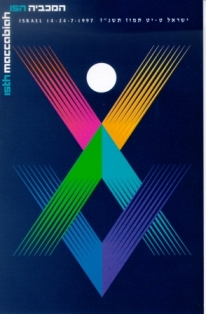Bridge collapse
The Games were marred by the collapse of the bridge, causing some athletes on the bridge who were marching into the Ramat Gan Stadium in Tel Aviv District for the Opening Ceremony to fall into the highly polluted Yarkon River; the polluted waters were considered a major factor in the deaths and injuries. [6] Four Australians, Greg Small, Elizabeth Sawicki, Yetty Bennett, and Warren Zines, were killed when the bridge, supporting the Australian delegation, collapsed. Sixty others were injured.
After the accident, both the Opening Ceremony and the Games themselves continued with spectators in the stadium not given any information as to what had happened. The ceremony was delayed, and then only the torch lighting aspect of the ceremony took place. Spectators became aware that something was wrong when none of the scheduled events took place, including the march of the athletes, and when they listened to the radio. Many inquests were completed into the collapse of the bridge by both Israeli and Australian authorities and Yoram Eyal was found guilty of criminal negligence. [7] To commemorate the tenth anniversary of the disaster, on July 20, 2007, a ceremony was held at Tel Aviv's Yarkon Park. [6]
Notable competitors
In track and field, Michael Halika of Israel, a future Olympian and World Championship bronze medalist, won the 800m freestyle and the 400m individual medley, among a total of 5 individual and 2 team gold medals in the juniors. [8] Israeli Yoav Bruck won gold medals in the 50-meter freestyle and 100-meter freestyle. [9]
American 1992 Olympian Tamara Levinson earned 5 golds in rhythmic gymnastics. David Bluthenthal and Ryan Lexer won a gold medal in basketball with Team USA. [10] [11] American Stuart Krohn won a gold medal in men's rugby team.
Daniela Krukower from Argentina won a silver medal in judo at U66. [12] Israeli Gil Ofer won a gold medal in judo in the U78, and Israeli Ariel Ze'evi won a bronze medal in the U95. [12] Canadian Olia Berger won a bronze medal for Canada in judo in the O72, and Canadian Olympic bronze medalist Mark Berger competed in judo. [12] [13]
In ice hockey, Team Canada won the gold medal, with National Hockey League players David Nemirovsky and Brian Wilks, as well as players Greg Gardner, Adam Henrich, Michael Henrich, Mikhail Nemirovsky, and Cory Pecker. [13] [14] [15] Hockey player Billy Jaffe was team captain for the silver medal-winning Team USA, which also had on the team National Hockey League defenseman Mike Hartman and Gabe Polsky. [16] [17]
Australian first-class cricketer Michael Klinger won a gold medal, when he was 17 years old. [18] Australian Jonathan Moss competed in cricket. [19]
Shawn Lipman was the flag bearer for the U.S., represented the United States in rugby union, was team captain, and was selected as MVP of the Rugby Event, as the team won a gold medal. [20]
Canada's Olympian Peter Bakonyi won a silver medal. [21]
In soccer, Lev Kirshner played for the United States. [22]
Olympic long-distance runner Dan Middleman competed for the U.S. [16] Tennis player Dave Abelson competed for Canada. [13] David Zalcberg competed for Australia in table tennis. [23] [24] [25] Olympic champion sabre fencer Vadym Gutzeit competed for Ukraine. [16]
This page is based on this
Wikipedia article Text is available under the
CC BY-SA 4.0 license; additional terms may apply.
Images, videos and audio are available under their respective licenses.

